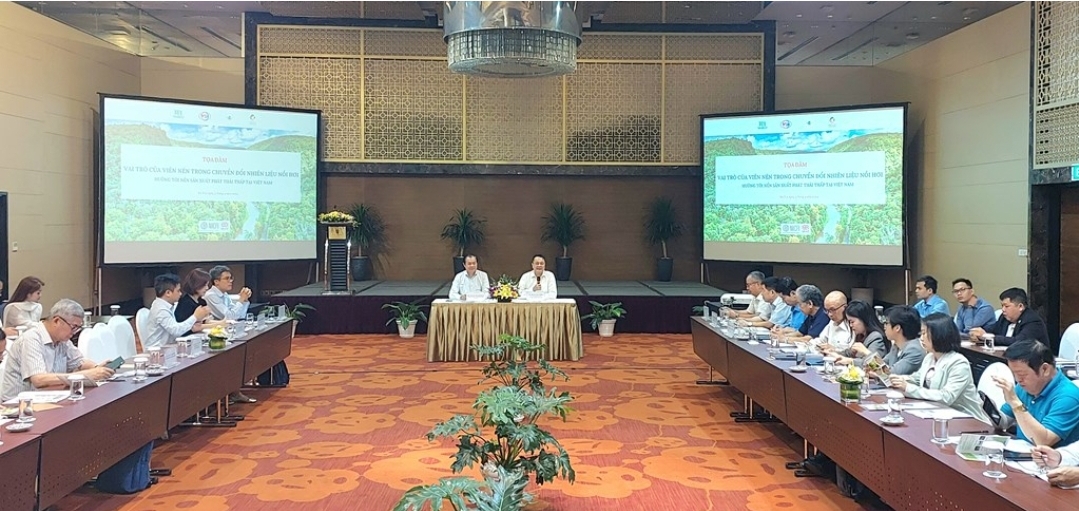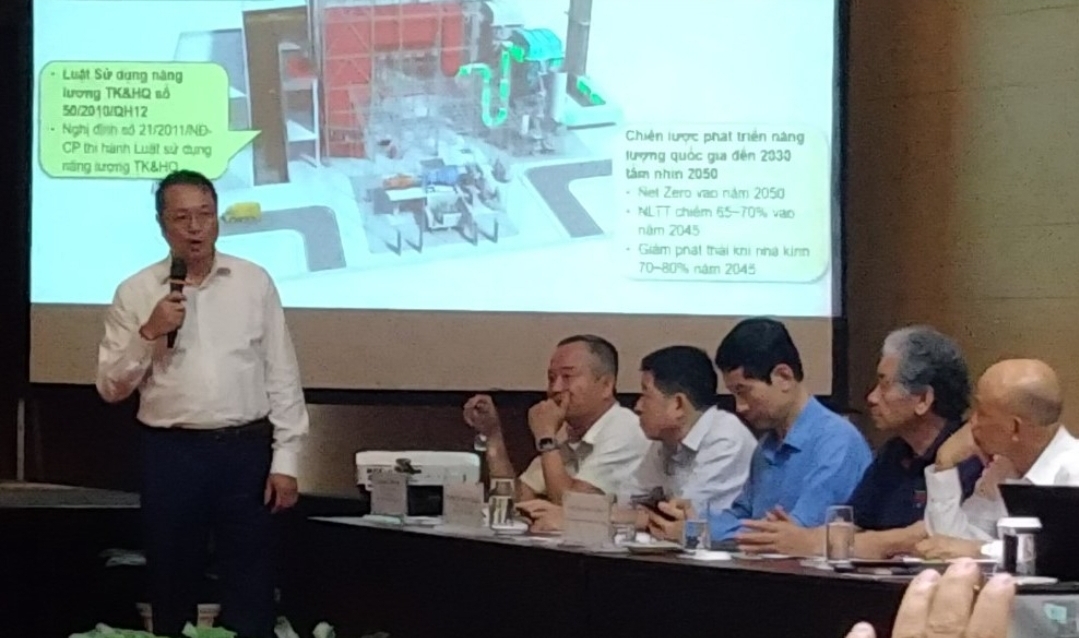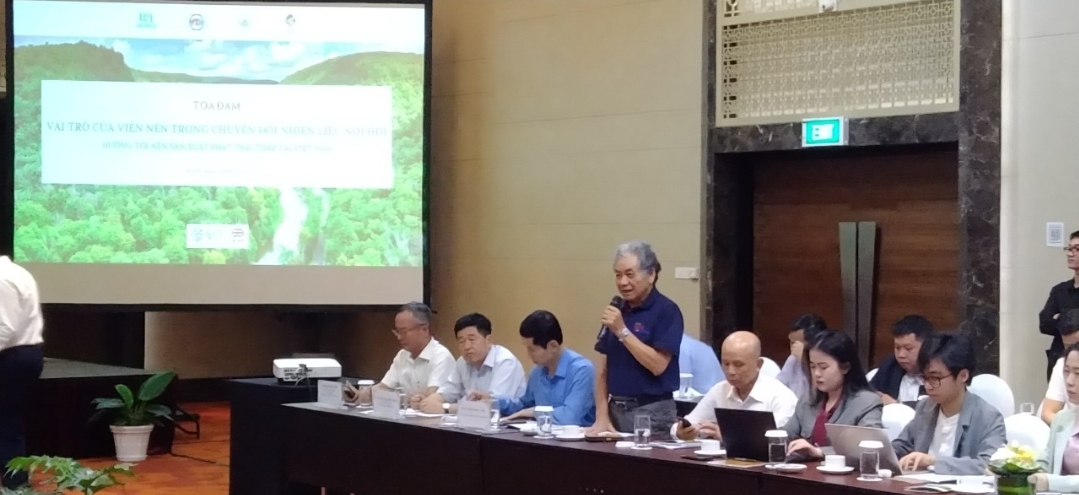Attending the seminar were Dr. Tran Van Luong, Chairman of the Vietnam Environmental Industry Association, Mr. Nguyen Thanh Phong – Head of the Vietnam Wood Pellet Association, state management agencies, scientists, wood pellet manufacturing enterprises, boiler manufacturing enterprises and enterprises using boilers in production. On the side of the Vietnam Union of Science and Technology Associations, there was Assoc. Prof. Dr. Truong Manh Tien, Member of the VUSTA Presidium, Editor-in-Chief of the Environmental Economics Magazine.

cene of the seminar.
This seminar aims to promote the conversion of high-emission fuel sources such as coal and oil to low-emission wood pellets at small production facilities using boiler systems.
According to Dr. Tran Van Luong: In industrial production in Vietnam, industrial boilers are used to provide heat, steam, and hot water for the following industries: light industry: textiles, footwear, plastics, tobacco, food, alcohol, beer, soft drinks, seafood, agricultural processing…; heavy industry: basic chemicals, fertilizers, mineral selection, pesticides, sugar production, rubber production…
The fuels used for boilers are electricity, oil, gas, coal, biomass (rice husks, wood chips, sawdust, wood pellets…). Currently, Vietnam does not have a complete official statistic on the number of industrial boilers. According to information from organizations that annually inspect boilers and register with the state labor management agency, it is estimated that there are about 9,000 industrial boilers in operation in Vietnam.

Dr. Tran Van Luong, Chairman of the Vietnam Environmental Industry Association, spoke at the seminar.
Many of these facilities use coal to operate their boiler systems. Converting the input coal source of these facilities to cleaner fuel sources has great potential to reduce emissions on a national scale.
Meanwhile, the Vietnamese pellet industry in general and wood pellets in particular have grown strongly in recent years. Wood industry by-products such as firewood branches, tree tops, sawdust, shavings, etc. are used to produce pellets.
About 95% of the pellets produced in Vietnam (about 5 million tons) are used for export, mainly to the Japanese and Korean markets. Exported pellets are used as input fuel, partially replacing the amount of coal currently used to produce electricity in these countries. Only about 5% of the total supply of pellets is currently used domestically, mainly in the boiler systems of small-scale production facilities. Many facilities that have been and are making this conversion are in the global supply chain, for example suppliers for major brands such as Adidas, Nike, Samsung… Some facilities are located in industrial zones where there are commitments on low emissions, green conversion…
The seminar also pointed out that this is an opportunity for businesses to convert coal-fired boilers to biomass to reduce greenhouse gas emissions, meet environmental requirements, contribute to the implementation of the commitments of the Vietnamese government; opportunity to participate in the domestic carbon market in the future. At the same time, building the image of a green manufacturing enterprise, increasing the competitiveness of products in the domestic and international markets.
Although the benefits of using pellets instead of coal are clear, the current challenges for businesses converting boilers to biomass are not small. That is, businesses lack investment capital for the conversion; Lack of standards and regulations on manufacturing biomass boilers; limited design and manufacturing capacity of many boiler manufacturers. In addition, high new investment costs, renovation costs and production stoppage costs are the ones that businesses need to consider when making the transition. Another challenge is that the domestic carbon market has not yet formed, so it has not created a driving force for businesses.

Assoc. Prof. Dr. Truong Manh Tien, Member of the VUSTA Presidium, Editor-in-Chief of the Environmental Economics Magazine, contributed his opinion at the discussion.
Contributing his opinion at the discussion, Assoc. Prof. Dr. Truong Manh Tien said: The use of pellets in boiler fuel conversion towards low-emission production in Vietnam and the world is an inevitable trend in the world in environmental protection.
Currently, the World Bank is offering a purchase price of Carbon credits of 5-6 USD, which can be up to 7-8 USD/ton. The World Bank also allocates about 50 million USD for the northern mountainous region of our country to buy these credits. I highly appreciate this discussion. Because the Government is also giving very strong direction on the issue of developing a circular, sustainable economy and protecting the environment. I understand that the Ministry of Natural Resources and Environment currently has a fund of about 3,000 billion for environmental protection in Vietnam, for a clean development mechanism that businesses should also pay attention to in order to solve environmental problems in production and for the future of our children.
According to Dr. To Xuan Phuc, representative of Forest Trends, the Japanese market will continue to play an important role for the Vietnamese pellet industry in the coming time. Vietnamese businesses also have the opportunity to replace the supply of pellets from Indonesia for the Japanese market because the supply of pellets made from palm oil husks originating from Indonesia may not achieve the sustainability certification required by the Japanese market.
The Vietnamese Government is strongly committed to the target of Net-Zero emissions by 2050. To achieve this goal, the Government has issued a number of mechanisms and policies; including Decree 06/2022/ND-CP requiring high-emission production facilities as well as ministries and sectors to reduce greenhouse gas emissions. The Government is designing the necessary policy mechanisms to build a domestic carbon credit market. With the Government’s Net-Zero commitment, there is a lot of room for the use of pellets in the domestic market.
Concluding the discussion, Dr. Tran Van Luong said: The discussion was truly successful as it was a place to connect pellet production enterprises, boiler production enterprises and enterprises using boilers in production. In addition, there is a need for more in-depth discussions that today’s discussion could not fully address.
In addition, it is also necessary to raise awareness for boiler users of enterprises, especially small and medium enterprises, about knowledge of efficient energy use with low emissions, aiming to participate in the carbon market when the carbon market operates. Along with the standards and regulations on biomass boilers, there should be a policy mechanism to support industrial enterprises to convert fossil fuel boilers to biomass boilers.
VINAGREENS – in addition to providing biomass fuels from wood, is also one of the enterprises with a large production output of wood pellets with a capacity of more than 100 thousand tons/year.
As a commitment to the environment, we always prioritize the development of clean energy through the use of wood fuels and agricultural and forestry waste, contributing to sustainable development.
For any contact, please call hotline: 0912614688 or Email Sale.vinagreens@gmail.com.



